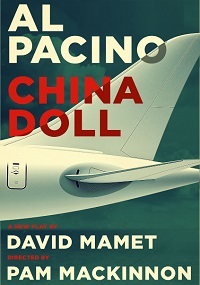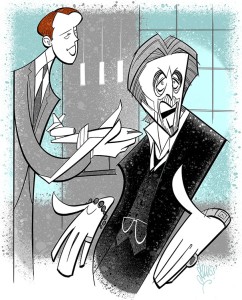CHINA DOLL Passengers: We Are Experiencing Turbulence
It began with the announcement that Al Pacino would appear in CHINA DOLL, an original play by David Mamet on Broadway. Fans who will go see Pacino on the big stage no matter what, whether it’s Shake-speare’s Merchant of Venice or Mamet’s American Buffalo—snatched up tickets for the fifteen week run that began at the Schoenfeld Theater in October this year.
That was the pro-Pacino buzz.
And as if from some law of drama physics, a counter-buzz met the pro-buzz with comparable force. This buzz was generated by speculation that the legendary-but-aged Pacino (75) couldn’t remember his lines. Rumors fixated on technical prompting devices that gave his memory assistance. Deriders of CHINA DOLL didn’t have to see the play to form an opinion. They’d heard all they need to know. The anti-Pacino buzz.
Finally, after two months of previews, CHINA DOLL opened in early December. Finally we’ve gotten past the glare of the lead actor’s stardom and honed in on Mamet’s play. Finally we won’t have to listen anymore to the vultures and boo-birds who get off on rooting for someone to fail. The critics have considered the play and set things right. Right? Hmmm. Wrong.
CHINA DOLL’s Critical Reception
Even while acknowledging the pro and con vibrations that CHINA DOLL inspired, many reviewers fell prey to the turbulence surrounding the production. In the half dozen reactions to the play that I read, the reviewers didn’t register much beyond experiencing Mr. Pacino. His clothes, his hair, his grasping for words and failing energy, the relationship they perceived between he and his costar and his director. In the few lines devoted to Mamet’s writing, the play elicited shrugs, dismissals, and . . . bafflement. Some were generous in laying blame. Guilt for the confusion rests on the playwright and the performer rather than the ignorance of the confused. Many reviewers could only register that CHINA DOLL is two hours of meandering declamation, Mickey Ross, Al Pacino’s character, spewing and sputtering Mamet-speak on the phone.
More than a month ago I saw the play while it was in previews, took notes, took in the buzz, got reactions from random attendees, thought about the play, thought about the playwright, and the tradition of theatre he comes from. What has gotten lost is that CHINA DOLL is a solid play and an important piece of social commentary. It invites eavesdropping into the comic and disturbing worldview of a member of the ultra rich, “a malefactor of great and unearned wealth,” to use Mamet’s phrase.
CHINA DOLL is the flipside to the first Broadway collaboration of Pacino and Mamet, American Buffalo (at the Booth Theater in 1983). In Leslie Kane’s compilation, Mamet in Conversation, the young playwright who’d written American Buffalo compares the delinquent class, the clumsy burglars of this early play, with the highest levels of society, the leisure class, and finds their behavior to be identical. In 1977, a young Mamet said:
The people who create nothing, the people who do nothing, the people who have all sorts of myths at their disposal to justify themselves and their predators–they steal from us. They rob the country spiritually, and they rob the country financially.
One of the attendees of CHINA DOLL that I spoke to approached me in the mezzanine and asked me what I thought the play was about. I told her that to me it was a glimpse and an earful into the world of a billionaire. Her eyes flashed anger and she said, “I don’t think he’s rich.” This reaction surprised me. How else could he afford to buy a sixty million dollar jet as a wedding gift to his beautiful young fiancé if he weren’t extremely wealthy? Then I realized what she meant. She didn’t think Mickey Ross was rich because his behavior was classless. He wore his tuxedo as if they were rags, his posture was hunched and desperate, and he shouted expletives. He didn’t fit with her romanticized idea of the rich.
In this country many of us have long worshiped the almighty dollar and those who have come by it. We surmise that the wealthy must know what they’re doing. They have money. They’re winners, the opposite of losers. Or are they? Instinctively the playgoer I spoke with may have hit on what Mamet set out to do with CHINA DOLL: finish the other half of what he’d begun with American Buffalo and, in so doing, exhibit how the behavior of the leisure class and the delinquent class are identical. Perhaps the best joke in CHINA DOLL is the subtextual one it puts on its Broadway audience.
WHAT’S HAPPENING?
This is a line at a key juncture in the play. Mickey Ross discovers that his new jet plane is in hock. He surmises that it’s being held by authorities in Toronto, prodded by the governor of New York, due to Ross making moves to evade paying the sales tax (five million dollars). Coinciding with this, his girlfriend, Frankie Pearson, is missing. When Ross asks in frustration, “What’s happening?”—this question echoes a line in Samuel Beckett’s seminal play Endgame.
In Beckett’s play, Hamm asks Clov the same question. Clov answers, “Something is running its course.” His answer is true to life in general and true to Mickey Ross’s life in particular as the action of CHINA DOLL takes its course and moves toward its tragic end. Like his mentor Harold Pinter, David Mamet writes plays partly in the absurdist tradition of Beckett, partly fixed in the realism of our time. In some ways Mamet is an American Pinter. The British Nobel laureate was a hero to Mamet as a kid and was responsible for him starting to write.
Mamet clearly has used Beckett’s Endgame as a model for CHINA DOLL. Mickey Ross interacting with the world by telephone, his never seeming to see his situation for what it is, suggests the blindness and immobility of Hamm. Ross, like Hamm, thinks of and plays at life as it were a game of chess. Ross justifies the aggressive moves he makes on the telephone, to his assistant Carson, with his view that life is just playing chess and checkers. Unwilling to do the grunt work of dialing the numbers—to function at a level beneath his position and power–the billionaire depends on Carson to keep “getting” whomever he needs to speak to on the phone. Carson functions for Ross much as Clov does for Hamm. He does the “legwork” of setting up the phone calls, just as Clov does the legwork of caring for Hamm, of moving the ladder around and of climbing up the ladder to peer out the tiny window at the watery world.
The First Twenty Minutes
The play begins with Carson entering with a newspaper. Ross, in a panic because he doesn’t know the whereabouts of his fiance, rejects the newspaper and berates Carson for offering it. He won’t allow Carson to explain that his girlfriend (Francine Pearson) is exactly where she is supposed to be, checked into a luxury hotel in Toronto; Carson wants to say that she doesn’t seem to be there because she is checked into the hotel using a different name. In the first few minutes of the play Ross demonstrates how his temper blinds him and blocks him from taking in key information.
Carson (Christopher Denham) comes across at once as a kind of everyman. Added to this he has the name of the former “talk show” host, Johnny Carson, who made a career out of his “everyman” appeal and delivered monologues with material drawn from the newspaper. All of the anger and paranoia of Ross could have been prevented if he had simply allowed Carson to speak. Once Ross discovers the truth, his apology flows out of him as easily as the insults and abuse. He admits the problem is what he calls “an old man’s love.” He offers Carson words of wisdom that he learned from his father.
A man who can’t admit to his faults must atone for his virtues.
Unfortunately for Ross, identifying his problem, his old man’s love for a much younger woman, doesn’t keep him from succumbing to it by play’s end. His Lear-like fits of temper and his blindness to a world that moves outside of and beyond his power are what do him in. By the end of the play, when he won’t allow Carson to speak again, his plans for a happy retirement come crashing down all around him; this refusal to listen to his assistant, to take the ordinary man seriously, proves disastrous.
In the next THINK TWICE DRAMA post, I will continue to examine the script. Please leave a comment by scrolling down, down, down. csj




I really enjoyed your review of China Doll and the “buzz” around it. It sounds like a sharply relevant and important play, and it sounds from what you describe as though that is why people are focusing on gossip and trivialities–to distract themselves from the discomfiting truths the play challenges us with. Sort of like when the newscaster interviewing Bernie Sanders asked him about his hair…….
thank you. the ad hominem attacks were over the top.
I agree with Carolyn. Now, I’m tempted to see the play.
So, who, or what, is the CHINA DOLL ?
Great question! It’s what I’ll be writing about in the next post.
We love to build people up and then tear them down. I haven’t seen CHINA DOLL, nor will I. But I was more than willing to believe that Pacino and Mamet had succumbed to their own egos and failed miserably. Thanks for making me think twice about my own assumptions.
Thank you! I find the play more interesting, than entertaining. Terry Teachout in the Wall Street Journal wrote a positive review, one that describes the play as “a strongly wrought story of considerable moral complexity.”
I thought of Carson in Downton Abby.
Arthur Diamond
While Mamet and Pacino are giants and we want them to go well together, I was among the (likely) many put off by the recent NY Times review, so that it was easy for me to decide that I didn’t have to see this production. Thanks for putting in the time and insight to change my mind.
I’ll be viewing in the context of American Buffalo but also the current race for the White House, where one leading candidate in particular is very wealthy and, as you report, therefore must know what he’s doing; a winner, not a loser. Let us hope that the attendee of CHINA DOLL that you spoke to in the mezzanine is now one of your ardent subscribers!
This is the best comment on China Doll I’ve read so far. I dismissed this as a star vehicle gone wrong, but I was wrong. The problem with the theater in this country seems to be critics who are more than happy to tear our greatest writers and performers to shreds. If they succeed too well, everyone will be out of a job.